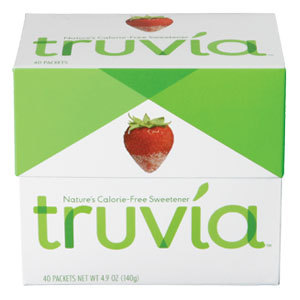Top Class Actions’s website and social media posts use affiliate links. If you make a purchase using such links, we may receive a commission, but it will not result in any additional charges to you. Please review our Affiliate Link Disclosure for more information.

Plaintiff Denise Howerton alleges in the Truvia class action lawsuit that the stevia extract Rebaudioside A (Reb A) makes up only 1 percent of Truvia. She claims that the product is actually a chemically processed and purified form of stevia leaf extract. She also points out that the main ingredient is erythritol, which Cargill claims is derived from natural processes. Cargill is producing the ingredient in such large quantities, however, that the process is actually rendering it synthetic rather than natural, the class action lawsuit says.
“Plaintiff did not receive a natural sweetener primarily made from the stevia plant; rather, she received a product that is made predominantly of a synthetic ingredient with only a miniscule amount of Reb A, which itself is harshly chemically purified, in contradiction to defendant’s representations,” the Truvia class action lawsuit states.
According to the class action lawsuit, Cargill and The Coca-Cola Co. combined efforts to develop a natural, zero-calorie sweetening ingredient for their food and beverage products. In 2008, the companies revealed that they had used Reb A, the extract of stevia plant leaves, to create this sweetener.
Cargill claims that its Truvia Natural Sweetener is the first natural sugar substitute. The company has advertised it as “nature’s calorie-free sweetener” and claims that “Truvia sweetener comes from nature.” The product’s label is adorned with natural imagery such as stevia plant leaves, which it uses in the product’s labeling, advertising and marketing materials.
Howerton says in the Truvia class action lawsuit that Cargill uses the natural imagery to boost the product’s sales. She believes that the company’s claims that Truvia is a natural sweetener convince consumers that the product does not contain chemically processed ingredients. As a result, they believe that they are making a healthy choice when purchasing Truvia over competing sweeteners that do not claim to be natural.
Howerton accuses Cargill of deceptive advertising and marketing and claims that the company misleads consumers by describing the process of making Truvia as “similar to making tea.” Specifically, Howerton takes issue with the following representations from Cargill:
“Stevia leaf extract is born from the sweet leaf of the stevia plant, native to South America. Dried stevia leaves are steeped in water, similar to making tea. This unlocks the best tasting part of the leaf which is then purified to provide a calorie-free sweet taste.”
While the company touts Truvia’s natural ingredients, Cargill fails to inform consumers about the ethanol, methanol or rubbing alcohol it allegedly adds while purifying the product. According to the class action lawsuit, Cargill claims that erythritol “is a natural sweetener, produced by a natural process, and is also found in fruits like grapes and pears.”
Howerton claims that when she purchased the Truvia product, she believed that Truvia was a natural sweetener that was derived mainly from the stevia plant. Because she believed it to be a healthy alternative to other sweeteners on the market, she was willing to pay a premium for Truvia. According to the class action lawsuit, Truvia costs nearly 300 percent more per packet than Sweet ‘N Low, and 67 percent more than Splenda. Howerton claims that she never would have purchased Truvia had she known that the product contained synthetic ingredients.
The Truvia class action lawsuit is brought on behalf of all people who purchased Truvia from the date the product was released in 2008 until the date the class notice is distributed. It accuses Cargill of violating Hawaii’s deceptive trade practices statute and various state consumer fraud laws. It is also bringing claims of unjust enrichment and breach of express and implied warranties.
Howerton is represented by Christopher M. Burke and Joseph R. Guglielmo of Scott & Scott LLP; Jared H. Beck of Beck & Lee Trial Lawyers; E. Kirk Wood of Wood Law Firm LLC; Greg L. Davis of Davis & Taliaferro; and Lawrence W. Cohn.
The Truvia False Advertising Class Action Lawsuit is Denise Howerton v. Cargill Inc., Case No. 13-cv-00336, in the U.S. District Court for the District of Hawaii.
UPDATE: Cargill Inc. has reached a $5 million class action settlement in a separate Truvia false advertising case (Martin v. Cargill). A preliminary approval hearing is scheduled for October 23, 2013.
UPDATE 2: The $5 million settlement was denied by a federal judge and a new $6.1 million class action settlement reached for all cases. Instructions on how to file a claim for the Truvia class action settlement can be found here or visit www.TruviaSweetenerLawsuit.com for details.
UPDATE 3: A federal judge granted final approval to the Truvia class action settlement on Nov. 26, 2014.
UPDATE 4: Payments from the Truvia class action settlement were mailed to eligible claimants the first week of May.
ATTORNEY ADVERTISING
Top Class Actions is a Proud Member of the American Bar Association
LEGAL INFORMATION IS NOT LEGAL ADVICE
Top Class Actions Legal Statement
©2008 – 2024 Top Class Actions® LLC
Various Trademarks held by their respective owners
This website is not intended for viewing or usage by European Union citizens.















62 thoughts onClass Action Says Truvia’s ‘Natural’ Claims Are False
i bought it because it was natural. guess i was wrong. i’ll file a claim too.
I thought it was the best and it should have been for the price.
I wanted to eat healthier. I’ve been using it since it came out..NOT any more..I’m done with it!
b6u33
b6u33
Great I use this and have for awhile. I read all the information on this product before I purchased it.
I am 63 year old and trying my best to live healthier, eat healthier, and be healthier. Cargill, you knowingly sold me Truvia containing processed chemicals and I ingested them. I adopted and am raising my grandson and need to be here on earth for him. How could you do this to me? How can you look at yourselves in the mirror every single day?
Well, guess I’ll tear up my truvia coupons. This is so jacked up…wow! :(
Well, guess I’ll tear up my truvia coupons. This is so jacked up…wow! :(
I am completely outraged about this. I started purchasing this product when it was first introduced in stores, and I was sure based on what was advertised on the packaging that it was ‘all’ natural. I have used it regularly, and will be filing a claim. Total disbelief!!